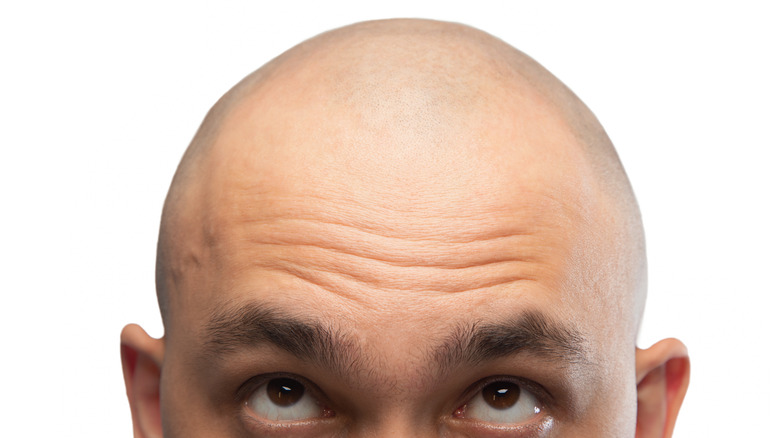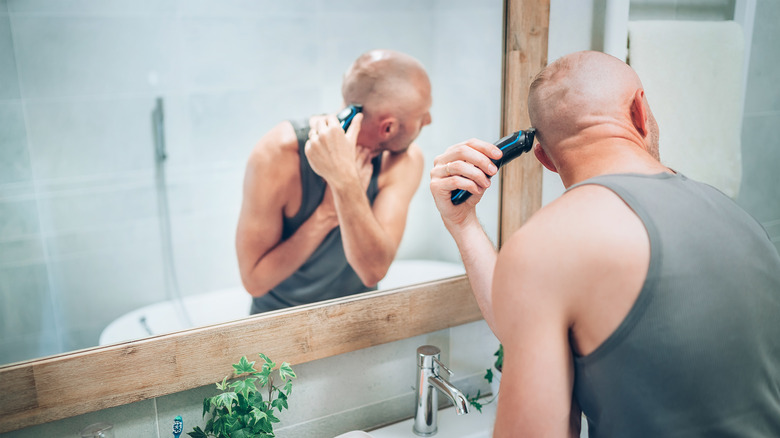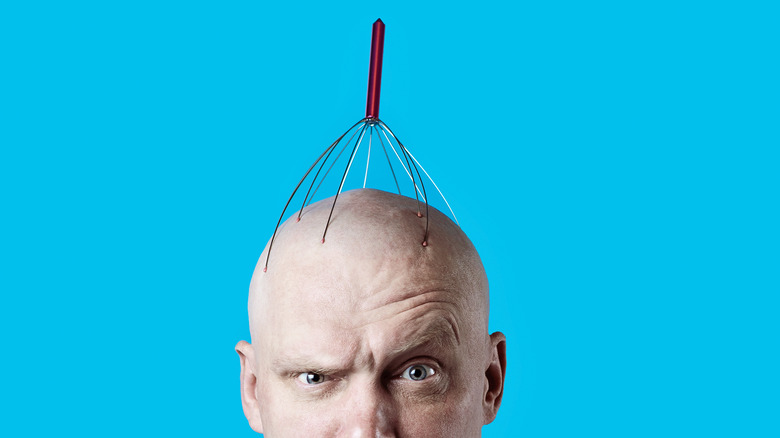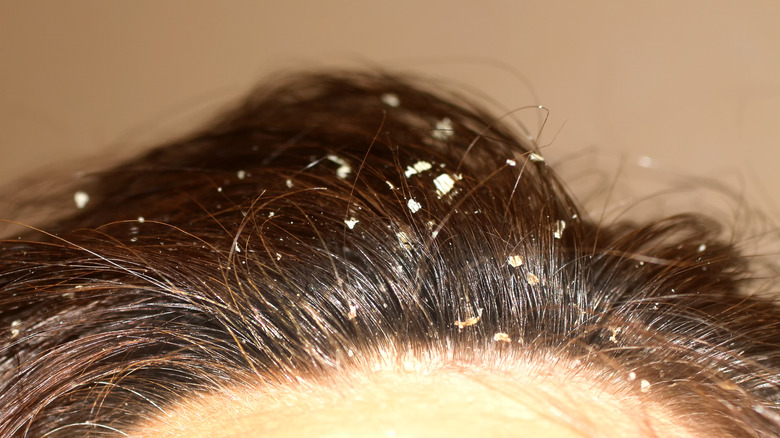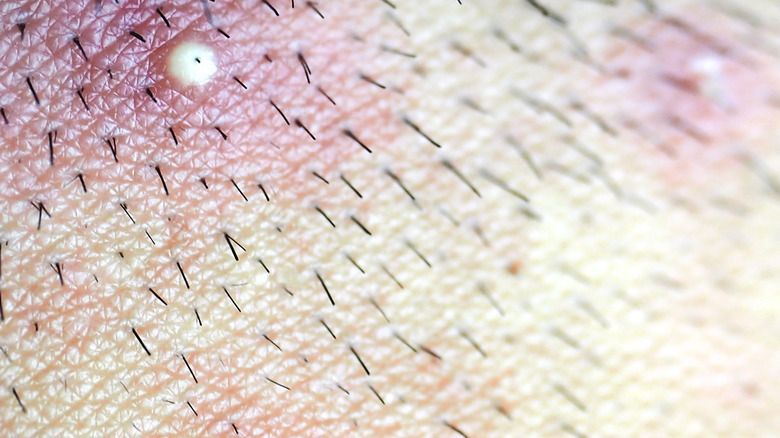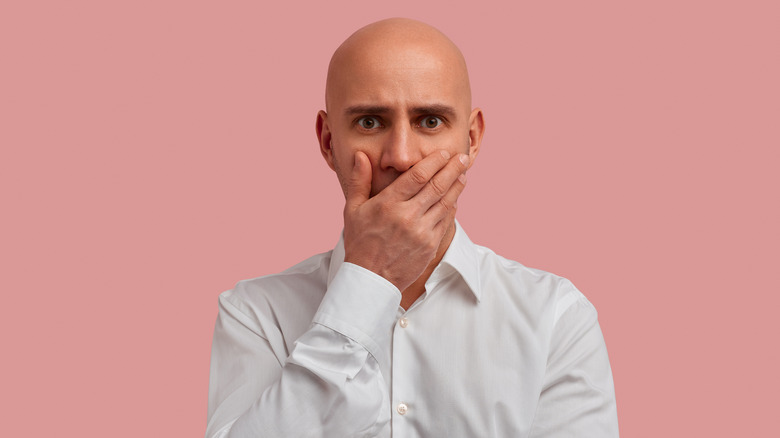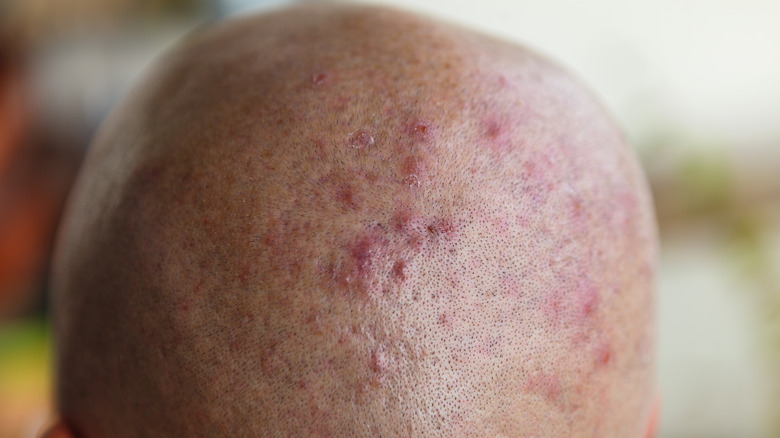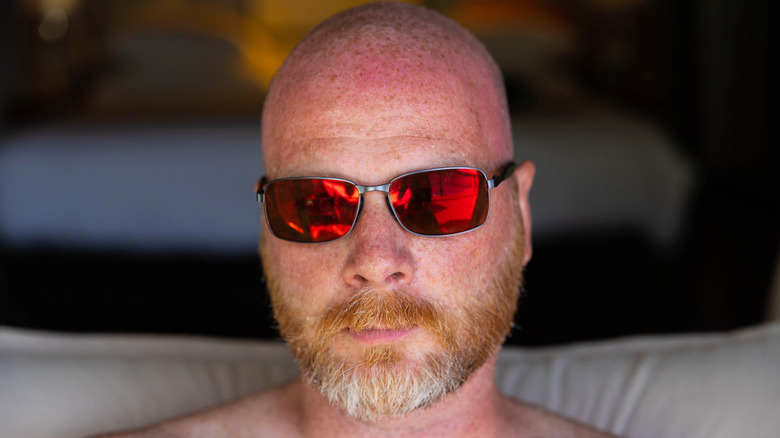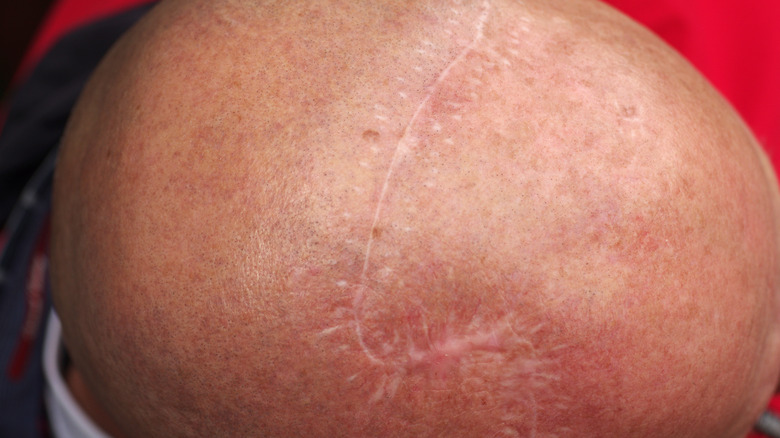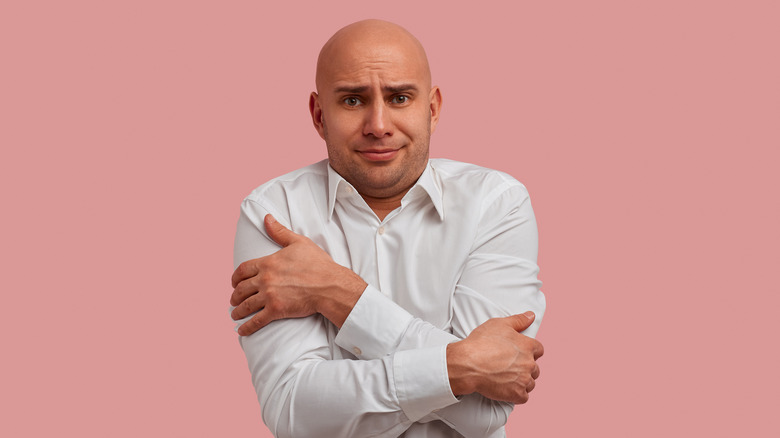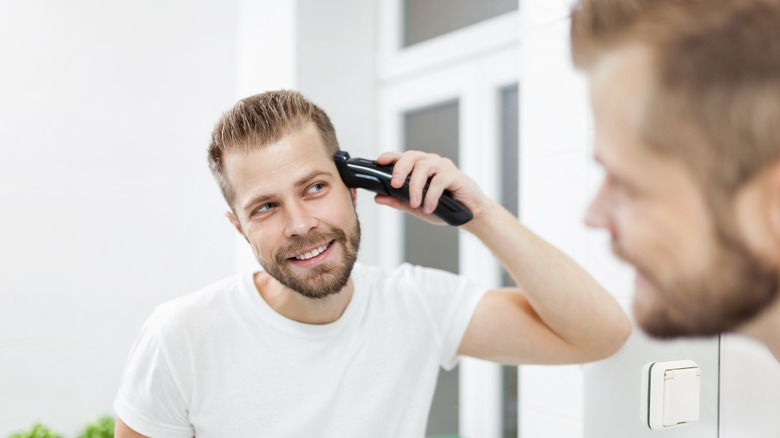What Really Happens To A Man's Body When He Shaves His Head
Since ancient times, men have been shaving their heads, and the reasons are myriad — from religious to political to cultural to social (per Vogue and The New York Times).
While there are lots of reasons why a man might decide to shave his head and keep it that way, embracing a low-maintenance lifestyle is most definitely not one of them. Unless you have already lost every hair on your head due to alopecia or other natural causes, if your hope is to maintain a smooth and shiny scalp for a lifetime, you'll need to commit to a lifetime of shaving that head of yours every one to three days, according to LA barber Rob McMillen's estimate (per Business Insider).
Of course, shaving his scalp on the daily or near-daily is only one among a long list of tasks for which a man is signing up, metaphorically speaking, when he decides to embrace the full Bruce Willis. And shaving cream is just one of the products with which he will be well-advised to acquaint himself, per The Strategist. Nor is shaved-head maintenance solely about cultivating one's personal style. It's also about maintaining the health of your scalp, which goes to the health of your body in general. You see, many interesting things can happen to a man's body when he shaves his head. Some will require his attention on a regular basis, some are just good to keep in mind, and some are just too good not to mention.
A man who shaves his head may become more sexually active
In 2012, the journal of Social Psychological and Personality Science published a comprehensive analysis of then-current scientific data on how society perceives men who shave their heads. What it found was that men who shave their heads tend to be seen by both men and women as more dominant, more confident, and more masculine, as well as stronger, taller, and older, than men with full heads of hair. And this is true even when comparing photographs of the same man — one with his hair intact, and one with his hair having been digitally removed.
The aforementioned study did not seek to illuminate whether men who shave their heads are more sexually active. However, other studies have demonstrated that men who are taller and/or who appear more dominant tend to register as more attractive to women (via The Conversation). The same is true of men who give off a more masculine appearance, as per a 2018 study published in the journal of the Association for Psychological Science. Given that men who shave their heads may come off as more "manly," and that women tend to prefer manly men (to more feminine-appearing men), a man who shaves his head may actually increase his odds of engaging in sexual activity with women, and certainly more than balding men who choose not to shave, as Psychology Today further elaborated.
When a man shaves his head, he may have to deal with more razor burns
As noted above, when a man shaves his head with the intention of keeping it that way, he's going to have to assume that he's signing up for a lifetime of shaved head-related maintenance.
First and foremost, maintaining the smooth look requires frequent shaving — anywhere from three to seven times per week, per Business Insider. While there is a lot to be said for the exfoliating benefits of shaving (via The Art of Shaving), frequent shaving also comes with a few minor health risks, including razor burn and its obnoxious cousin, razor bumps (aka ingrown hairs, as discussed elsewhere herein), per Healthline.
Razor burn is a skin irritation caused by your razor, according to New York City dermatologist Dr. Joshua Zeichner (via Everyday Health). "As the razor blades move over the skin, they can disrupt the outer skin layer, leading to microscopic cracks, loss of hydration, and inflammation." Razor burn can leave you feeling anywhere from mildly to moderately uncomfortable, and can last for hours up to days. Since razor burn is usually the result of shaving skin dry (as opposed to with water, shaving cream, or other shaving products), using a dull razor, and/or shaving in the opposite direction of hair's natural growth (via Healthline), avoiding these pitfalls is a good first step. If that fails, a dermatologist can help evaluate what's going on and how best to remedy it, per Everyday Health.
A shaved head may result in dry, itchy scalp
When a man shaves his head, he may begin to notice the skin on his scalp becoming dryer, according to Healthline. In many cases, dry scalp responds well to non-comedogenic moisturizing lotions, oils, and creams (as we noted above, no one ever promised that shaving one's head would be a low-maintenance endeavor). Nevertheless, dry and irritated skin on a bald head may feel quite uncomfortable, and can also cause flaking (via Medical News Today).
Still, while flaking skin from the scalp is often characterized as dandruff (whether by laymen or clinician), the reality is that not all dandruff is caused by dry skin (via Healthline). And to the extent that dandruff has other causes, including excess oil produced by the sebaceous glands, shaving of the head may indeed work to control the flaking. As University of Pittsburgh dermatologist Dr. Viktoryia Kazlouskaya explained in an interview with Health Digest, "Shaving will not completely help with dandruff. However, [the dandruff] may be less visible [with shaving] because it won't [get] 'stuck' to hairs."
Here is how shaving your head can help control dandruff
Interestingly, shaving the scalp happens to be a scientifically accepted method for controlling the flakes associated with dandruff, according to Mayo Clinic and a 2006 paper published in the International Journal of Cosmetic Science.
In an interview with Health Digest, New York-based dermatologist Dr. Dina D. Strachan explained that dandruff results from "a reaction to normal yeast that live on the skin, especially oily areas like the scalp." Dead skin cells and oil serve as food for them — and shaving one's head helps decrease their food supply (and thus control dandruff). As Dr. Joshua Zeichner, Mount Sinai Hospital's Director of Cosmetic & Clinical Research in Dermatology, explained to Health Digest, "Shaving the hair removes the oil that builds up and creates an environment that is not optimal for yeast to grow," leading to reduced flaking and inflammation.
In addition, shaving one's head can reduce the risk of developing seborrheic dermatitis, believed to be among the most common causes of dandruff. Unlike dandruff caused by dry skin, dandruff caused by seborrheic dermatitis results from an excess of oils in the scalp, which build up and eventually flake off, per Healthline. The shaving-related absence of hair can actually circumvent some of the processes involved with developing seborrheic dermatitis, including an overgrowth of malassezia, a fungus that occurs naturally on the scalp but whose overgrowth is associated with increased sebum production by the sebaceous glands (and the resulting flaking observed as dandruff).
Shaving the head may cause ingrown hairs
An ingrown hair is a hair that grows back into the skin, according to the Cleveland Clinic. Ingrown hairs are a common occurrence associated with shaving. That's why ingrown hairs are often referred to as "razor bumps." Accordingly, any part of your body that you shave on a regular basis is going to be at some risk for developing ingrown hairs. However, men with coarse and/or curly hair are at slightly higher risk, because coarse and curly hair is more likely to curl in on itself.
An ingrown hair can feel like a tiny, mildly painful bump on the skin. In most cases, ingrown hairs will heal without medical intervention within a week or two, in part because at some point, the hair grows long enough that the errant tip may spontaneously spring back out of the follicle. Sometimes, however, an ingrown hair can become infected, becoming less tiny and more painful. In addition, an ingrown hair can lead to the development of unsightly pus-filled pustules, which can lead to scarring.
There's no reliable way to avoid ingrown hairs completely, but you can minimize their frequency by avoiding shaving your head dry and/or without the protective layer offered by shaving cream. Using a single-blade razor and shaving in the direction hair grows may also help. To prevent ingrown hair from becoming infected, you'll want to wash your hands frequently and avoid picking at it or otherwise touching it, per Healthline.
Shaving the scalp can precipitate a scalp infection
The more often you subject any area of your skin to shaving, the more likely it is that you will find yourself dealing with nicks, cuts, and skin irritations. As Healthline points out, the scalp is no exception. Most of these are nothing more than minor annoyances. However, any time the integrity of the scalp is compromised by a break in the skin, there is some risk of developing an infection, per Medical News Today. Since the scalp represents around 10% of the body's total surface area, according to the author of a 2010 paper published in the Journal of Drugs and Dermatology, when a man shaves his head regularly, he's clearly increasing his odds of infection.
In fact, the risk of scalp infection that shaving presents is significant enough to have mitigated, in recent years, against shaving the heads of some patients about to undergo brain surgery, as discussed in a 1997 study published in Pediatric Neurosurgery. And whereas shaving may be a precipitating factor in post-operative scalp infection, "not shaving" prior to surgery is not associated with any increase in the likelihood of infection, per a 2018 study published in the same journal.
One of the most common types of scalp infection is folliculitis — the term for an inflammation of the hair follicle, according to WebMD. In most cases, folliculitis presents no long-term problems, but occasionally, a more serious infection requires antibiotics or other medical intervention.
Scalp acne may develop or become more apparent when a man shaves his head
When a man decides to shave his head, he's probably not thinking about the possibility of developing acne on his scalp. Nevertheless, scalp acne is the same as any other kind, according to Dr. Shane McKeown (via ZelenLife), which is to say that it's an inflammation of the skin that occurs when the pores become blocked — whether by oil, dead skin, bacteria or otherwise.
In men who don't shave, scalp acne tends to occur along the hairline. In men who do shave their heads, scalp acne may occur anywhere on the scalp, and shaving itself may reveal acne on the scalp that was always there but which was hidden by hair (per Healthline). In addition, the act of shaving may precipitate scalp acne because men who shave their heads are subjecting the skin on their scalp to bacteria from nicks, and irritation, according to dermatologist Dr. Oanh Lauring (via Scary Symptoms). And that bacteria can precipitate an acne breakout.
Since skincare products themselves have been to cause acne pimples (via the American Academy of Dermatology), men who shave their heads who also use moisturizers, sunscreen, and other skincare products on their scalps may be more likely to develop acne on the scalp — unless they are careful to avoid some of these ingredients and others that may block pores. It's also worth noting that acne and pimples are not actually the same thing.
When a man shaves his head, his sun exposure increases, as does his risk of sunburn
Given that the scalp comprises around 10% of the total body surface of a human, one thing that a man must force himself to think about when he decides to shave his had is whether he's ready to deal with taking responsibility for protecting his precious dome from the effects of UV radiation. Because if he does not, he may be in for one of the most painful sunburns he's ever experienced up until that moment, according to Yahoo! Finance. Not only is the scalp in the "direct path of sun rays," as dermatologist Dr. Viseslav Tonkovic-Capin told Yahoo Finance, but in addition, "as the skin on the scalp gets routinely exposed to the sun it gets thinner, with weaker and weaker immune and regenerative functions."
Further, the scalp may take longer to heal from a sunburn, particularly if a man who shaves his head had already been losing his hair. The reason, according to Dr. Tonkovic-Capin, is that the skin heals by regenerating itself with stem cells, and stem cells are found in hair follicles. "The balding scalp has fewer hair follicles and therefore fewer stem cells — making it harder to restore after any kind of insult, including sunburns," he explains.
Men who shave their heads are at an increased risk for skin cancer
It is fairly well-established that when a man shaves his head, he puts himself at an increased risk for a sunburned scalp, and a painful one at that (via Yahoo! Finance). Since The Skin Cancer Foundation has stated that sunburn is the leading cause of the three most commonly diagnosed skin cancers — i.e, basal cell carcinoma, squamous cell carcinoma, and melanoma — does that mean that it's safe to assume that men who shave their heads are also putting themselves at a higher risk for skin cancer?
While we know of no peer-reviewed scientific study that has ever sought to elicit an answer to that particular question, a 2017 study published in the International Journal of Cancer came awfully close. In that study, a team of dermatological researchers from New England analyzed the health records of 36,000 men (culled in connection with the Health Professionals Follow-up Study, a large-scale, long-term study whose purpose is to evaluate factors influencing the incidence of various diseases in men) to determine whether and to what extent a relationship exists between skin cancer and male pattern baldness of varying degrees, without making a distinction between men who shaved and men who did not. What the researchers found was that, as you probably guessed, the men with hair loss were at an increased risk for a diagnosis of skin cancer on the scalp, in addition to on the neck.
When a man shaves his head, he might feel colder ... or not?
As between men and women, the struggle for control of the thermostat is real (and has been, for as long as there's been a thermostat to control), according to a 2021 study published in Global Ecology and Biogeography. However, a small study published via the Cornell University Library in 2004 suggests that when a man shaves his head, he might not be quite so impervious to the cold. Specifically, the study demonstrated that the less hair on one's head, the more quickly and dramatically heat is lost from the body under cold environmental conditions. It's worth noting, however, that this study appears not to have been peer reviewed, and there's no way of knowing exactly what the temperature was, at least not beyond the fact that it was winter in upstate New York.
Further, this study stands in potential conflict with a subsequent study published in 2015 in Industrial Health. What that study found, at least in a general sense, was that the presence of hair had little effect on the loss of heat from the body. With that said, the 2015 study was even smaller than the one performed at Cornell. In fact, it had just eight participants, and what it set out to determine was not whether the presence of hair insulates the scalp against hypothermia, but whether the presence of hair stands to interfere with the cooling process under heat stress conditions.
When a man shaves his head, his hair will only appear to grow back thicker
Whenever you get a haircut, your hair can feel thicker, at least temporarily. That's because the human hair shaft is tapered at the end (via Scientific American) such that what you're cutting off is, in fact, the thinnest portion of each strand.
The thing is, cutting your hair doesn't actually make it thicker, and certainly not from the follicle, since cutting your hair doesn't have any effect on the follicle at all (per BBC Science Focus Magazine). Accordingly, when a man shaves his head, it may appear to grow in thicker, but the act of shaving — which is really just another way of saying cutting the hair off at the scalp — will not lead to the actual cultivation of a thicker head of hair overall.
On the other hand, if a man's goal is to make his hair appear thicker, shaving may accomplish that, as the hair first begins to grow beyond the surface of the scalp. And to the extent that feeling as if his hair is growing in thicker (however temporary it may be) offers him a nice, internally manufactured hit of dopamine as a reward, then wouldn't it be fair to say that shaving his head delivered an actual benefit?

